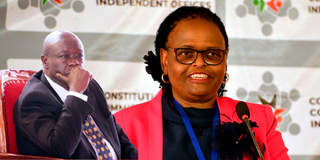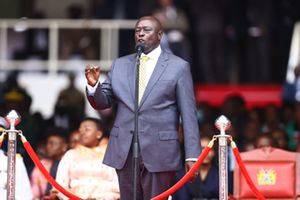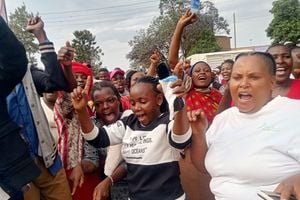
Deputy President Rigathi Gachagua and Chief Justice of Kenya, Martha Koome.
After 29 failed attempts to stop the impeachment process at the High Court, Deputy President Rigathi finally appeared before the Senate to defend himself over accusations of gross misconduct among other charges.
Mr Gachagua’s last attempt to stall the process was dashed on Wednesday morning by a bench of three judges of the High Court ruling that Parliament should be allowed to carry out its mandate without interference.
A total of 29 petitions had been filed by Tuesday before the High Court in various stations, including Nairobi, Kiambu, Kirinyaga, Nyahururu and Eldoret, but other than certifying the cases as urgent and raising weighty constitutional issues, the judges declined to grant any conservatory orders.
Mr Gachagua filed two petitions himself while the rest were filed by other people.
Justice Richard Mwongo directed the National Assembly on October 3, to conduct the public participation exercise at constituency level in a petition filed by Kirinyaga Woman Representative Jane Njeri Maina, but the judge declined to stop the process.
In Nairobi, Justice Lawrence Mugambi ruled that six petitions which were before him raised substantial questions of law that required further interrogation and forwarded the files to Chief Justice Martha Koome for appointment of a bench of three judges, to determine the cases.
Another judge, Justice Chacha Mwita, made a similar ruling but declined to stop the impeachment process as sought by Mr Gachagua.
Public interest
On Wednesday, Justices Eric Ogola, Anthony Mrima and Dr Freda Mugambi ruled that public interest lies in allowing the constitutional process of other institutions (Senate) to proceed unhindered.
The judges further said the applications by Mr Gachagua and other petitioners were premature and anticipatory and that the DP was asking the court to speculate on the outcome of the senate proceedings.
“On the argument that the applicant ceases office once impeached, we are of the view that every office holder can only assume office legally and constitutionally. The assumption of office cannot oust the court’s jurisdiction.
“The court has unfettered powers to check on the process at whatever stage,” said the judges.
The bench said there are instances where courts can intervene and stop a process but “we hold that this is not a case where such an application can be granted automatically”.
“We therefore find that the doctrine of separation of powers will be best served in declining the application at this stage,” said the judges.
Through senior counsel Paul Muite, Mr Gachagua had submitted that his petition would be rendered useless if the Senate is not blocked from proceeding with the impeachment process.
He argued that his successor is likely to be picked rendering petitions useless, yet there are clear violations of his right to fair hearing and the principle of public participation.
Parliament opposed the applications arguing that a similar application by Mr Gachagua had earlier been dismissed by Justice Chacha Mwita.
The judges agreed stating that Mr Gachagua was seeking the same prayers he had sought in the petition before the single judge, but nonetheless proceeded to determine the application.
“Unfortunately, we did not find any authority to support the assertion that an expanded multi-judge bench is superior to that of a single judge,” said the court
They added, “We have no doubt and do hereby find and hold that the application herein is similar to the other petition, hence caught up by the doctrine of res-judicata.”
The judges agreed that the six petitions raises weighty constitutional issues that require further interrogation by the court.
They directed the parties to appear before them for hearing on October 29.
“No prejudice will be suffered if the applications are not granted at this stage. The process (impeachment) is a lawful constitutional process and the Senate will conduct a trial where all the issues will be raised and determined,” said the judges.






